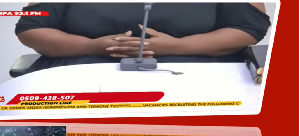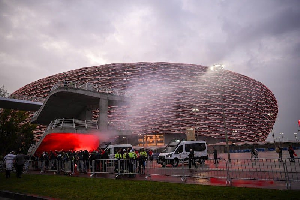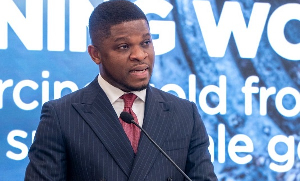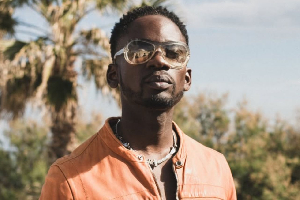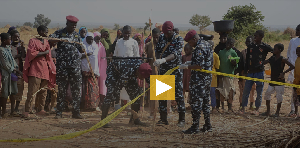By Kofi Ata, Cambridge, UK October 19, 2014
Nana Addo Dankwa Akufo-Addo was elected the Presidential Candidate of the main opposition party, NPP, for the third consecutive time to contest the 2016 presidential election. There was no doubt in my mind that Nana Akufo-Addo would be victorious and could have written this article on Friday October 17, 2014. What I did not envisage was the margin of his victory (94.35%). I expected Mr Alan John Kwadwo Kyeremanten to reduce Nana’s margin in the first round but he was soundly whipped again. The purpose of this article is to assess some factors that may or may not inure to his candidacy.
The first question that could be on the minds of many is, did the delegates make the right choice? The answer for me is simple, absolutely yes. I did not follow the campaigns of the two leading contenders but what I heard on Saturday’s Newsfile though unscientific, made me write off Alan Kyeremanteng as a serious presidential candidate. Alan was shown making a promise to provide motor bikes or bicycles to all party constituency executives for party work if elected presidential candidate. He added that those executives could take the bikes and bicycles away as their personal property after completion of their terms. That for me was nothing but an attempt to bribe and corrupt the vote. Again, the idea of what is meant for party work becoming private property was a recipe for future party disunity and conflict that a potential party leader and president should not even contemplate, let alone promise. Moreover, it was reported that Alan did not have agents at some polling stations in some regions including Asante. If that was the case how could he represent the party at the national level? It was no surprise Alan’s campaign never even took off and the outcome is a testimony of his monumental failure.
Many would also want to compare Nana’s chances with the late President Mills’s victory at the third consecutive attempt at the presidency in 2008. That may be true but are the conditions similar or the same? It would be difficult to make a realistic socio-economic comparative analysis and draw reliable conclusion because December 2016 is over two years away. However, looking at the current situation, Ghana’s economy is a mess with the government negotiating with the IMF for a bailout. Dumsor is back with vengeance, corruption is the order of the day, inflation is high, the cedi falling, etc. For these reasons, Nana Akufo-Addo stands a better chance if voters would be making voting decisions on the economy, corruption, dumsor and others and if by 2016 the situation has not seen any improvement.
Politically, what is not in Nana Akufo-Addo’s favour is that, he would be contesting an incumbent president whilst the late Atta Mills contested an incumbent party on his third attempt. The developing practice since the Fourth Republic is that, incumbent parties have been defeated after two terms (in 2000 and 2008) but not yet an incumbent president. Nana therefore has to beat both an incumbent party and the incumbent president. That would not be easy but doable.
The “two terms and you are out” practice in the Fourth Republic could favour Nana Akufo-Addo. However, it is not yet clear whether the developing two terms precedent is applicable to political parties or presidents. Both Ex-Presidents Rawlings and Kufuor served the two maximum two terms allowed under the constitution and their parties were voted out of office. NDC is in its second term but President Mahama is in his first four year term. This make the equation a bit complicated. Assuming the Ghanaian electorates’ practice is to give each party the two maximum terms and change course, then, Nana Akufo-Addo has a brighter chance in 2016 because NDC will be kicked out of office. However, if the practice is rather two terms for the president and not the party, then Nana Akufo-Addo would have a fight for his political life in 2016. I am of the view that the Fourth Republic is too young for voting patterns or presidential election results to become customary practice that could be interpreted to draw a definitive two terms to a party and you are out or to the president and you are out. It is therefore neither definitely for nor against Nana Akufo-Addo.
Unity within NPP from this day forward would be very crucial for Nana Akufo-Addo’s victory in 2016. If defeated and humiliated Alan Kyeremanten is brought on board to fully and actively campaign with him, then victory would be more likely for Nana. However, if that is not done and as we saw in 2012, Alan is an outsider then that could be bad omen not only for Nana Akufo-Addo but also for Alan himself because if Nana fails to secure the presidency in 2016 because of party disunity, he could be blamed for the party’s defeat. In that scenario, the Akufo-Addo faction could also pay him in his own coin if he becomes the party’s 2020 presidential candidate. What goes around, come around, so Alan must be strategic in this game of party unity. Only time will tell.
Indeed, it’s not only bringing Alan on board but his team as well as how Nana’s campaign team will relate to the national party Chairman and General Secretary who are supposedly regarded as Alan sympathisers. It may be even helpful if Nana Akufo-Addo could bring on board all the six other candidates who initially contested for the Flagbeareship. So far so good from what I saw last night on Joy Tv at the Efua Southerland Park. Both the two defeated candidates (Alan and Hon Francis Addai-Nimo) publicly pledge their support to Nana Akufo-Addo to ensure the defeat of NDC and victory for NPP in 2016. I hope they keep their pledges and must be given the opportunity to make meaningful contributions. It is also important for Nana Akufo-Addo to control particularly, Sir John and Kennedy Agyapong, if party unity is to be maintained for the common good.
Party unity is critical for Nana’s victory in 2016 because he would be facing a party that is more likely to be united behind President Mahama. Though NDC’s regional and national executive elections are becoming problematic, there is no doubt that President Mahama, unlike the late Mills will go unopposed for the party’s Flagbearship . This is because in his last cabinet reshuffle he strategically removed a threat from the likely contender by appointing Spio Garbrah a minister. He decided that it was better for Spio to piss out from inside than to piss in from outside.
Finally, there are two schools of thought when the future electoral and political implications of the 2012 presidential petition are analysed. Proponents of the first are of the view that Nana Akufo-Addo deliberately challenged the 2012 presidential results and subjected Ghana to eight months of uncertainty just to keep his political ambition (that of securing his party’s nomination) alive. For that reason, some voters may want to punish him for putting his personal ambition above the nation interest. I am of the view that those who hold such view are most likely to be members, supporters and sympathisers of the ruling NDC and who are also more likely to vote for an NDC presidential candidate than that of NPP. In other words, the impact on Nana Akufo-Addo’s chances in 2016 may be negligible.
The second group, of which I subscribe to, are of the view that the presidential petition brought out the deficiencies within the organisation and management of elections in Ghana and therefore was a very useful lesson that would improve the organisation and management of future elections. These are most likely to be independent voters who make voting decisions on issues of national interests and not along party lines. For this reason, I believe that Nana Akufo-Addo will benefit from some independent voters in 2016. That is, Nana will gain from the 2012 presidential petition. There could even be sympathy votes for him as a result of the petition.
In some of my articles prior to the 2012 presidential election and during the presidential petition, I predicted the political demise of Nana Akufo-Addo if he did not secure the presidency. Subsequent events have proved me wrong and in fact, Nana Akufo-Addo’s ability to stage a comeback after painful defeats can be likened to the proverbial saying in Ghana that the cat has seven lives. From what happened after the Electoral Commissioner declared the outcome of the 2012 presidential election through to shortly after the Supreme Court ruling until Saturday October 18, 2014 that culminated in his massive victory, I would not be wrong to conclude that the name Akufo-Addo is not only a person but an institution within NPP. Can his massive popularity within the party be turned into electoral fortune in 2016?
Kofi Ata, Cambridge, UK
Opinions of Sunday, 19 October 2014
Columnist: Ata, Kofi


